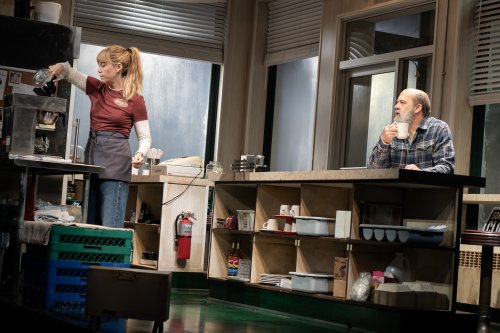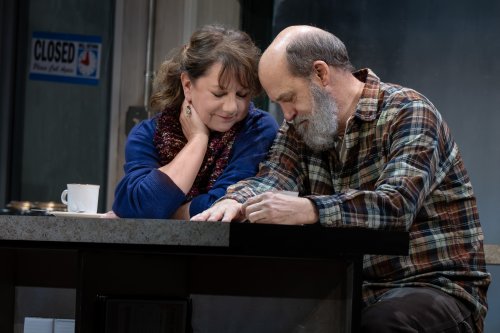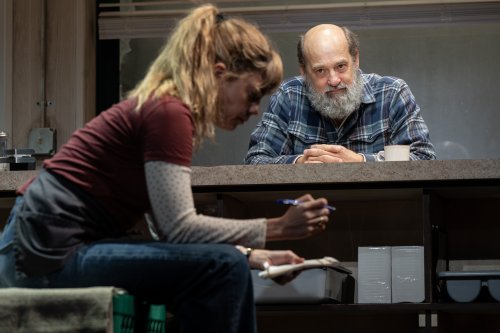The Counter
A new off-Broadway play looks for a reason to live in small-town America.

Susannah Flood and Anthony Edwards in a scene from the Roundabout Theatre Company’s production of Meghan Kennedy’s “The Counter” at the Laura Pels Theatre at the Harold and Miriam Steinberg Center for Theatre (Photo credit: Joan Marcus)
At around 80 minutes, Meghan Kennedy’s The Counter still manages to overstay its welcome, raising existential problems that become tiresome after the playwright abruptly shows an inability to explore them honestly. Accompanied by presumably unwanted audience laughter, that revelation comes through a sharp melodramatic turn that director David Cromer valiantly fights against, with the stalwart aid of an affectingly naturalistic cast, as well as the inviting verisimilitude of Walter Spangler’s greasy spoon set. But it’s a losing battle, undermined by Kennedy not having much to say about the complicated issues she would prefer to spin into lazy emotional manipulation.
Despite this obvious shortcoming of The Counter, Anthony Edwards, a growing New York stage presence after much TV and movie fame, resolutely ignores it, never letting Kennedy’s contrived writing come between him and the character (as a frustrated fan of ER, I’ve seen this steadfastness before). The scraggly bearded Edwards portrays Paul, a retired firefighter from far upstate New York whose geniality occasionally gives way to pronouncements about the monotony of his remaining days and the unfairness of his former ones. Although these gnawing thoughts are “secrets,” he shares them with Katie (Susannah Flood), a fairly new transplant to the area who is also a waitress in the diner he frequents when nobody else is around. That’s essential for Kennedy’s ludicrous plot, because Paul’s inner turmoil manifests itself in a grave request for Katie to do something that, if overheard, would cause any sentient adult to immediately contact the authorities, resulting in the play ending not too long after it begins, unless Kennedy felt like keeping the story going through a depiction of Paul’s psychiatric treatments.

Amy Warren and Anthony Edwards in a scene from the Roundabout Theatre Company’s production of Meghan Kennedy’s “The Counter” at the Laura Pels Theatre at the Harold and Miriam Steinberg Center for Theatre (Photo credit: Joan Marcus)
That Katie herself doesn’t immediately report Paul’s disturbing question to anyone is curious, to say the least; even if she believes Paul isn’t serious, what he asks her to do can’t be taken lightly. Nor should she blithely keep the deadly item he passes to her for the solicited deed close at hand. But, sans a shred of common sense, Katie leans irresponsibly on her own incredulity, despite the fact that her familiarity with Paul has only recently extended past his regular breakfast order. With little, if any, basis to assess Paul’s sincerity, let alone his mental health, it’s impossible not to marvel at Katie’s poor judgment, which, I suspect, isn’t what the playwright wants us to do.
Prior to Kennedy’s huge narrative misstep, The Counter is briefly intriguing, as Paul, seeing Katie’s mirrored loneliness, touchingly encourages her to regard him as a friend rather than a customer. It’s a sweet moment reminiscent of Terrence McNally’s heartfelt masterpiece Frankie and Johnny in the Clair de Lune, suggesting that Kennedy might want to imagine a similar relationship between two lost souls who meet at a diner, this time before they’ve fallen into bed together. But, whereas McNally finds meaning after intimacy, Kennedy simply chooses to avoid both.

Susannah Flood and Anthony Edwards in a scene from the Roundabout Theatre Company’s production of Meghan Kennedy’s “The Counter” at the Laura Pels Theatre at the Harold and Miriam Steinberg Center for Theatre (Photo credit: Joan Marcus)
Instead, Kennedy prioritizes easy theatricality, including internal monologues that are spoken out loud and attractively abetted by Stacey Derosier’s clarifying lighting design (the person cloaked in shadow can’t hear you!). It’s just one of the playwriting choices Kennedy makes that–again, unlike McNally–throws in the towel on the hope of human connection, as characters only reveal themselves to themselves. Determined to run out the clock on the possibility of Paul and Katie actually getting to know one another, romantically or otherwise, Kennedy provides each of them with a previous amorous entanglement to confront: the adulterous Peg (Amy Warren) for Paul and a lot of obsessive voicemails from a nearly beloved (an unseen Will Brill) for Katie. These aborted pairings with never or barely seen people are very important in The Counter, elucidating why Katie uprooted her life to become a waitress in a distant place and Paul can no longer feel joy, except apparently when inspiring Katie to give that voicemail guy a second chance.
Being positively reminded of a significantly better play is sort of a compliment, I suppose, but that allusiveness is a continuous double-edged sword for The Counter, especially when Kennedy becomes unambiguously haughty towards its remote locale. Paul is the one who stereotypically voices this distaste for existing beyond the reach of the Metro-North Railroad, blaming his despair on never having moved away from the middle of nowhere. More obnoxiously, he sarcastically judges Katie for leaving the big city to seek comfort anywhere else. Evidently, nobody is sad in New York. Cromer, who directed a stunning off-Broadway revival of Our Town roughly fifteen years ago, sensitively tapped into Thornton Wilder’s expansive idea that we’re all spiritual residents of Grover’s Corners, struggling to find earthly happiness, often in another person’s arms, while consistently failing to appreciate our luck at being alive. But in The Counter all good fortune ends in the Bronx, if not before the Harlem River. It’s no wonder Paul is so miserable, having to exist with such a teeny-tiny shot at the contentment Wilder argued is always right in front of our eyes, no matter where we live.
The Counter (through November 17, 2024)
Roundabout Theatre Company
Laura Pels Theatre at the Harold and Miriam Steinberg Center for Theatre, 111 West 46th Street, in Manhattan
For tickets, call 212-719-1300 or visit http://www.roundabouttheatre.org
Running time: one hour and 20 minutes without an intermission






Leave a comment